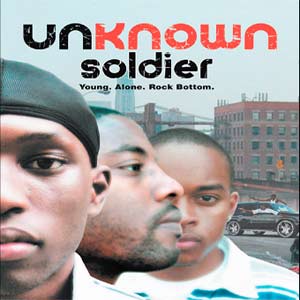Unknown Soldier
Music composed by Peter Calandra
Performed by Peter Calandra (piano, keyboards), Dale Kleps (saxophone), Bud Burridge (trumpet), Howard Joines (drums and percussion) and Kermit Driscoll (acoustic bass).
Available on MovieScore Media (MMS-06001 / iTunes)
Running Time: 33:29
The album can be found on iTunes at the following link.

See also:
Playing by Heart The Cooler Unknown Soldier (2004) is the premiere release of Moviescore Media, the new Swedish-based label run by film music journalist Mikael Carlsson. The label is the first dedicated internet only soundtrack producer and distributor, using on-line retailers like iTunes and focusing its efforts on scores from films of smaller budget with commercially unproven artists. It’s a rare positive aspect to the proliferation of online music exclusives and what will likely prove to be the long term extinction of the CD album – an increase in score availability.
Unknown Soldier is a very strong and moving film about Ellison, a young man whose father suddenly dies and after seeking physical and emotional shelter among friends, ends up homeless. Eventually he finds himself working for a street hustler named Zee. Ellison (perfectly portrayed by Carl Louis) is one of the many immature young teenagers who are prematurely forced to grow up and become men, facing the roughness of life before its time. Providing the musical accompaniment for this project is the relatively young composer Peter Calandra in his second feature outing, having previously scored 13th Child (2002) among his various short films and TV assignments. His small jazz ensemble puts primary emphasis on piano (played by Calandra), with strong support from Dale Kleps’ saxophones, Bud Burridge’s trumpet (both physical and muted), Howard Joines’ drums & percussion and Kermit Driscoll’s acoustic bass. Calandra also plays keyboards and digital sequencers (synthesizers).
The core idiom of the score is modern urban jazz, with emphasis on improvisation. The cues are mostly built on major scales and mixed up with various jazz scales. Mostly smooth, mellow and restrained (with some exceptions), it’s the kind of score which occasionally feels like you’re listening to the music of a modern city-set TV sit-com. This is pretty much evident from the first notes, in the ‘Opening Party’ with its Latin-colored percussion, intense hi-hat and snare drumming, piano, a groovy double bass motif as the basis, and muted trumpet and sax leads. The succeeding ‘City Biking’ follows in the same vein.
‘Teen Hijinks’ is one of the score’s most notable cues with its rhythmic hi-hat strongly echoing Henry Mancini’s famous Pink Panther theme and then going off into a very nice, playful and sneaky piano theme. The same theme is then passed through sax and trumpet as well, interweaved with improvisations from these instruments over a strong rhythmic acoustic bass. Equally a highlight is the gorgeous ‘End Credits’, a particularly uplifting, modern piano driven piece that essentially transmits a feeling of ease, familiarity and the warmth of a house and family. A truly beautiful piece.
Unknown Soldier also contains some darker pieces, notably ‘Fire Escape Meeting’, built on scattered and sustained piano lines that together with saxophone irresolutely convey a feeling of emptiness. ‘The Escape’ is another dark piece, driven by rhythmic bass, electronics, synths and a furious percussion set. This is a dense and involving piece, showcasing the wide range of the composer’s talent at writing for this ensemble. The rest of the score is filled up with smooth, easy-listening and uplifting piano improvisational pieces, the kind of which you’d be listening in a classy jazz bar at night. On the downside, there is no real orchestra present on the score and various pieces are dominated by scattered, cheap-sounding synth lines. Of course it’s understandable, given the limited-budget of the film, but it detracts from the listening experience, especially given they could simply have left those elements out of the mix.
Peter Calandra is presented here as a impressively-capable composer, with broad musical horizons. An evident feeling of passion, love and commitment is spread throughout his music, as it can be clearly extracted from the accurate and heartfelt piano performances and of the overall musical ensemble. While his talents here commend him to many future projects, the use of the jazz idiom in Unknown Soldier is certainly not something for every film music lover. Still, anyone who’d enjoy a very well built and performed, uplifting, easy-going and laid-back jazz score, reminiscent of Christopher Young’s relevant scores, should get this for sure.
Demetris Christodoulides
Rating:3
Return to Reviews Index